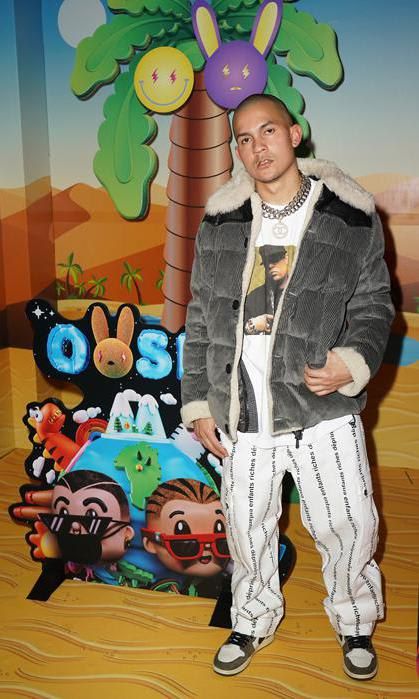Art Basel 2019 has brought out art, pop-ups and not to mention plenty of star-studded VIP parties. But this year, it’s also highlighted the power of reggaeton. In case you haven’t noticed, the genre has seen a major shift in the past few years and has made a powerful transition to the English-speaking market. Ozuna is making hits with Selena Gomez, J Balvin with Pharrell Williams and Bad Bunny teamed up with Cardi B to make one of the hottest tracks of the year I Like It. You may think it was a natural progression, but there’s one man behind it all—Puerto Rican producer Tainy.
“I think the recipe to making the perfect song is not trying to recreate whatever anybody is doing or just doing music for the business of it or to get money,” the Grammy-nominated producer told HOLA! USA at the orange carpet of The Kids That Grew Up On Reggaeton Presented by Neon16, Buchanan’s Whisky and Spotify Genius event. Together with President and Co-founder of NEON 16 Lex Borrero, Tainy presented the public with a reggaeton-centric exhibition that portrayed the biggest Reggaeton artists through the years with a series of photographs, art pieces and installations.
Before he and Lex participated in a discussion to talk about the impact of reggaeton, the two spoke to HOLA! USA about the future of the genre, who they'd like to work with and the fullproof way of making a hit song...
HOLA! USA: What's the recipe to making a hit song?
Tainy: “It’s complicated, there’s nothing specific, but you gotta try to keep evolving, keep doing new stuff that as a producer and as a musician, makes us fans of what we’re doing. I think that’s the recipe—not trying to recreate whatever anybody is doing or just doing music for the business of it or to get money. That’s when everything starts to drop. So I think keep pushing and keep moving forward. I think that’s what makes us connect with the fans."
You’re the mastermind behind many of today’s reggaeton hits—is there another genre that you’d be interested in tackling?
“I have a bunch. I do a lot of music. I think people know me more for reggaeton because that’s what I grew up doing and where I started my career, but little by little, I’ve been exploring more stuff. I’m a fan of Hip-Hop, I love Rock, so I like trying to put a little bit of those things into my production and into the Urban side. I think little by little, I’m getting into different genres, but I think it’s definitely going to happen because I’m a huge fan of music in general."
Is there one song or album you’re especially proud of?
“There’s a lot, but just to give you one because I’m super happy about what just happened with the Grammys and winning with Bad Bunny for X 100pre, I think that’s a special one. We worked hard on it and we were super happy with it and just to get the people connected with it, was something amazing.”
What's one artist that you dream of working with?
“Wow, there’s a huge list, but little by little, we’re taking names away from my list. I think I have to go with Frank Ocean. So let’s see if God puts me in the position, but I’m working and trying to get to those goals."
The reggaeton genre has seen a shift in the past few years and it’s become more popular in the English-language market. How do you think it will change in the next few years?
Lex Borrero: “I think reggaeton has become pop music. It’s going to continue to merge and have different colors in every area of music. So I think you’re going to start seeing rock influences like Bad Bunny has done. You’re going to start seeing more pop influences, more rhythm influences, African influences. I think there’s no limit—I feel like Urban Latin music is going to become the standard because we all like to move our bodies and that’s what it does for all of us."
,type=downsize)
